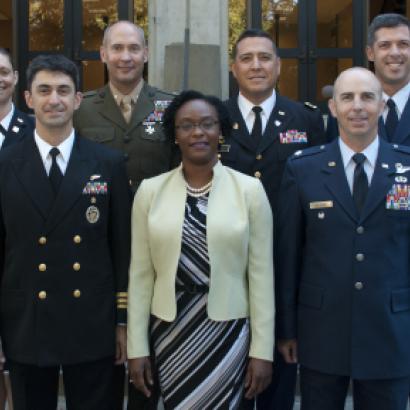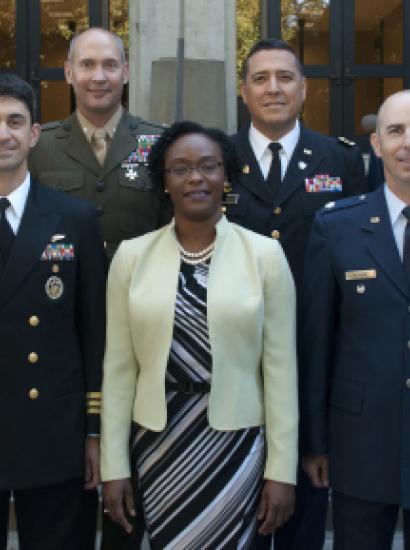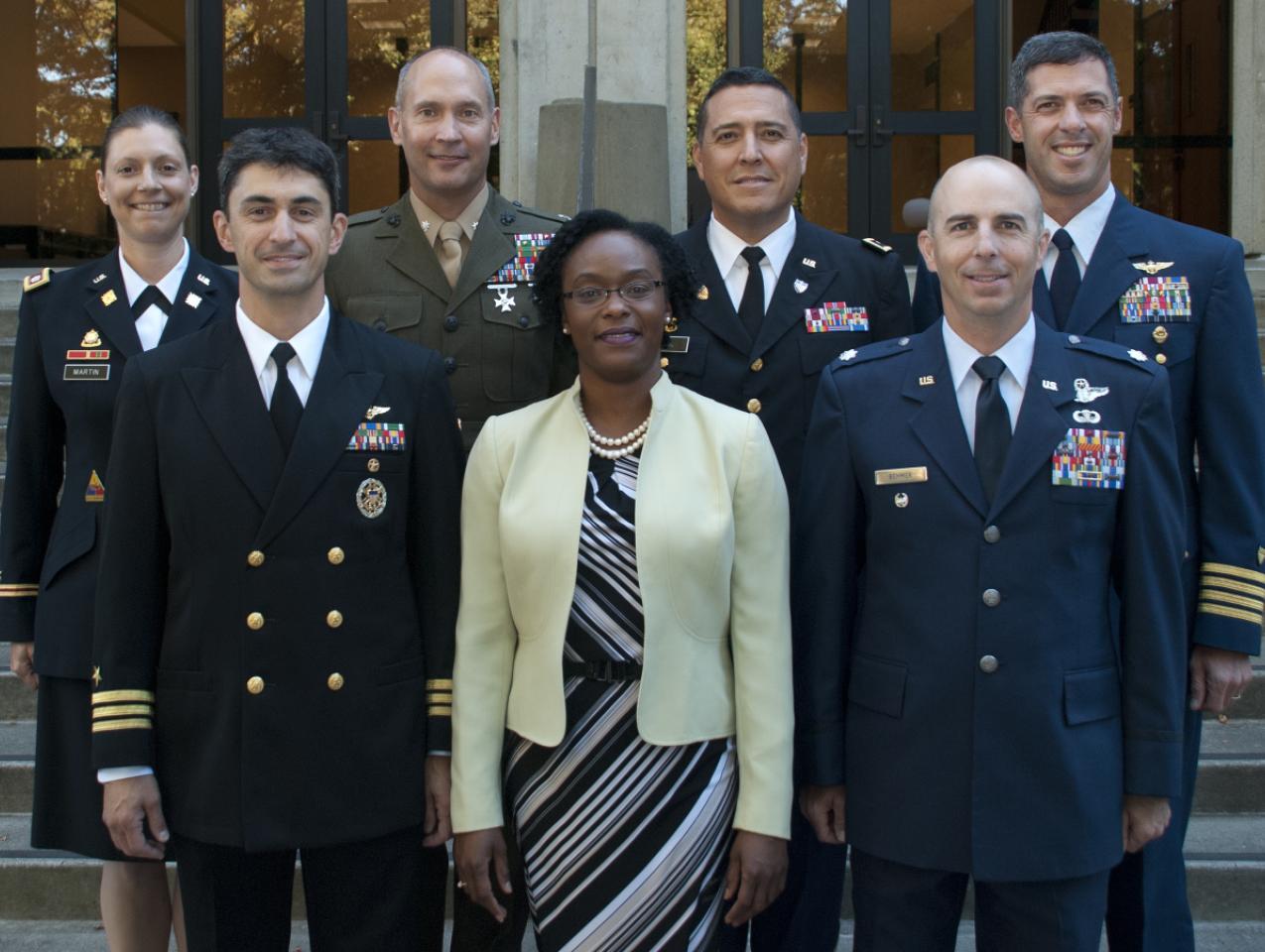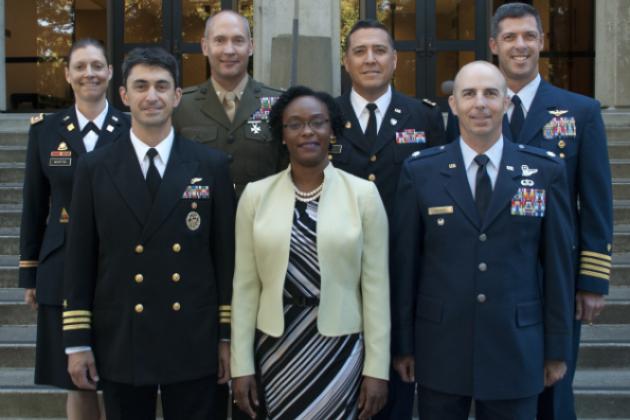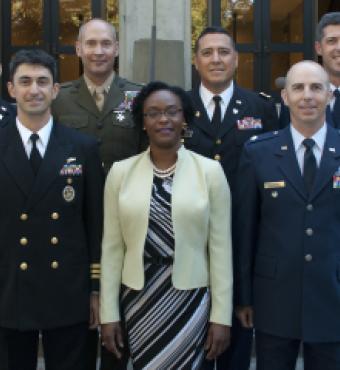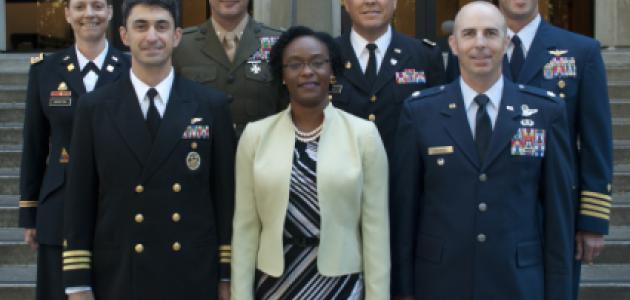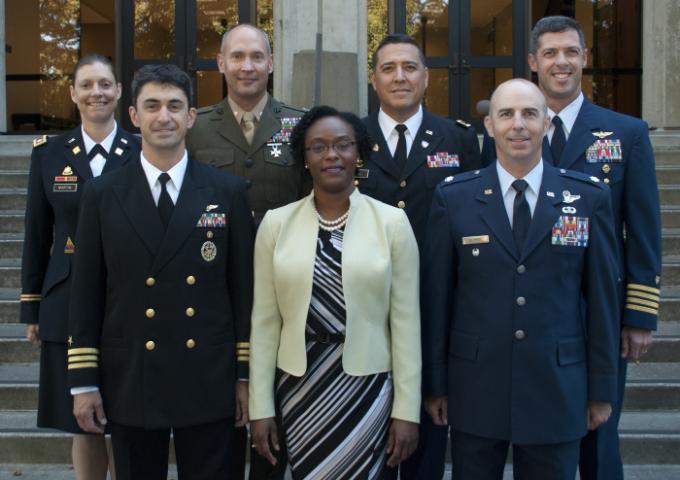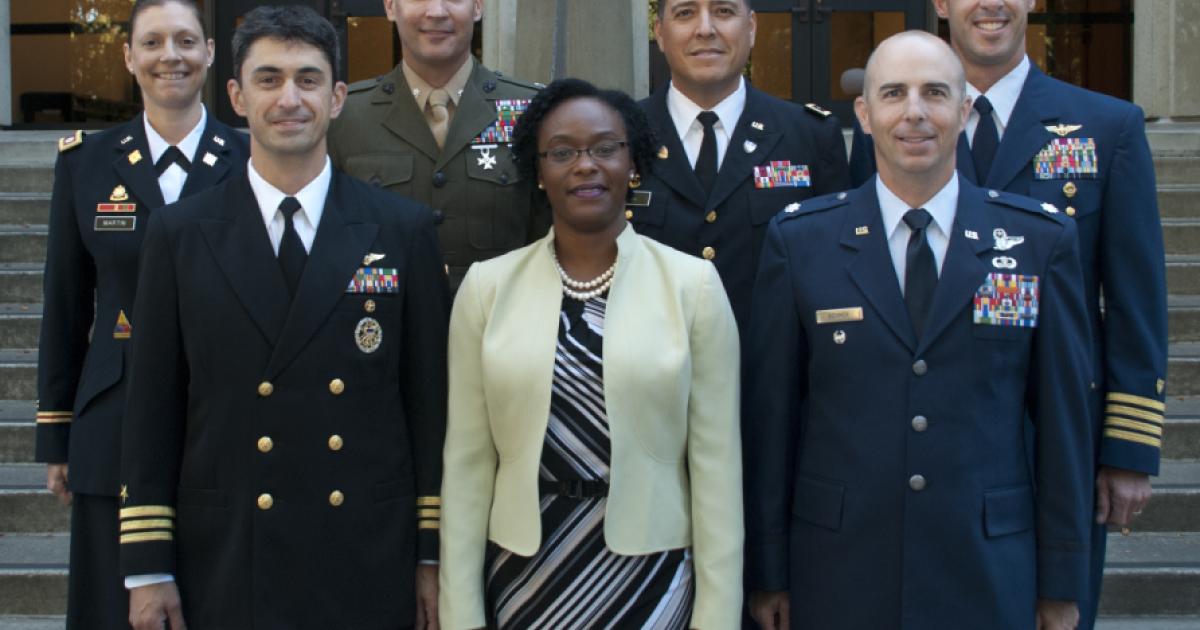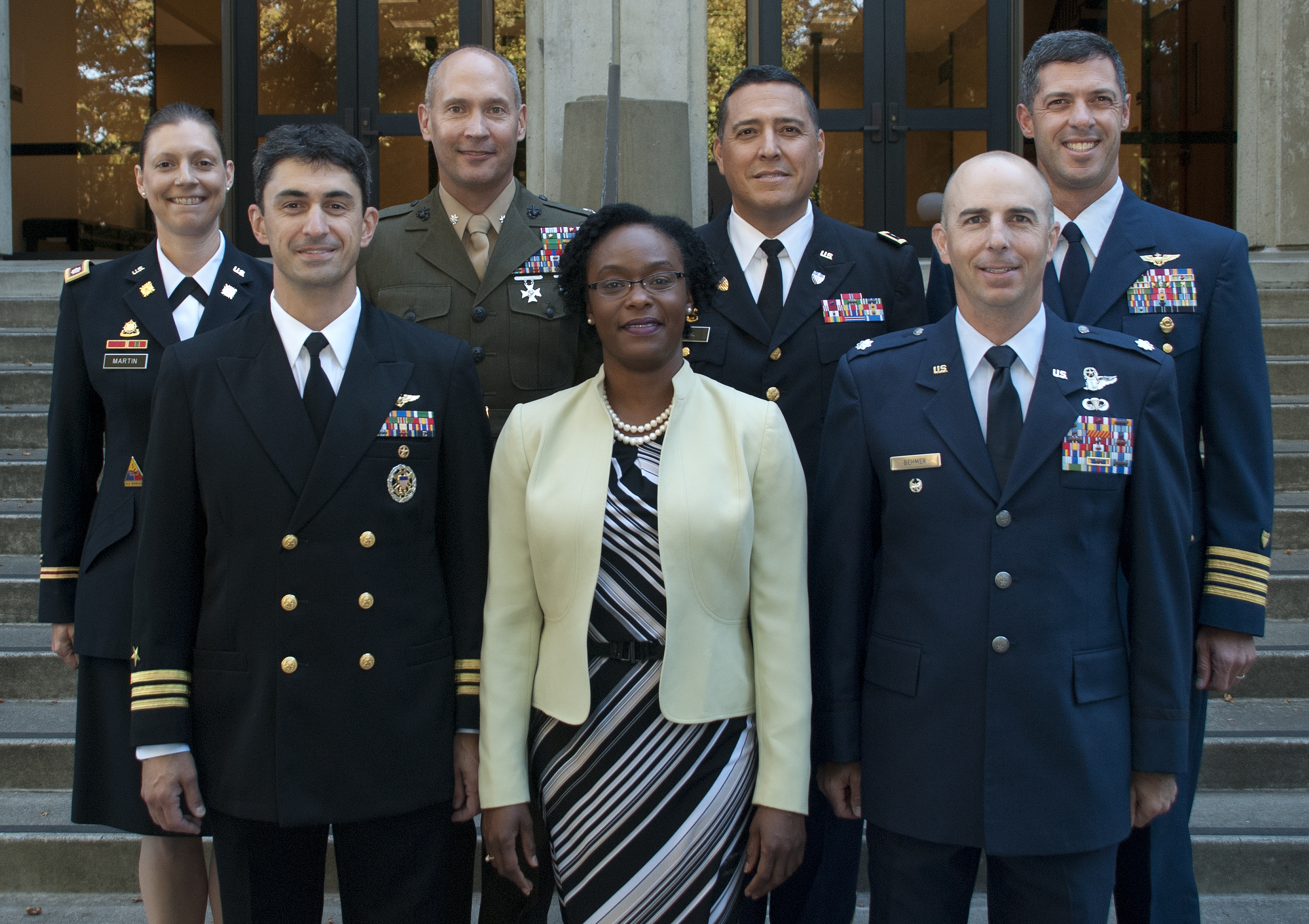
Each fellow enjoys a year of academic rigor and professional development, working closely with strategic thinkers at Hoover, studying under Stanford University scholars, mentoring Stanford students, and immersing themselves in the technology and innovation of Silicon Valley. In return, Hoover gains valuable insights from each fellow’s firsthand experience at the intersection of policy and operations around the world.
The 2015–2016 class of national security affairs fellows is replete with the knowledge, enthusiasm, and pride that makes the program such a valuable component of Hoover scholarship. Armed with distinct backgrounds, skill sets, and research interests, each national security affairs fellow shares a commitment to excellence in crafting policies that strengthen national security, improve international relations, and advance freedom.
Lieutenant Colonel Steve Behmer, representing the US Air Force, comes to Hoover as a self-described “pilot by trade” whose flight background includes command of the 354th Expeditionary Fighter Squadron at Campia Turzii in Romania, multiple deployments to Afghanistan, and several assignments flying the A-10C Warthog. Behmer has complimented his extensive experience in the air with numerous, strategic roles, including time on the air staff forward at Al Udeid, Qatar, and on joint assignment at the NATO Allied Air Command in Europe. He is currently applying his unique skill set to crafting innovative approaches to cyber security. “We need to get out of the paradigm that we must fight cyber with cyber,” says Behmer, “and focus on finding and exploiting our adversaries’ centers of gravity and noncyber vulnerabilities.” Developing his work into a comprehensive Air Force policy analysis, he highlights the important resources offered by Hoover. “The ability to interact with senior fellows at Hoover is pretty awesome. . . . the intellectual capacity of the institution as a whole makes research easy.”
Commander Todd Cimicata, representing the US Navy, joins Hoover as a qualified aviator and test pilot with flight time in more than thirty aircraft, including extensive experience piloting the F-14 Tomcat and F/A-18 Hornet. He brings a remarkable knowledge of policy and operations to Hoover, drawing on his time commanding a super-hornet squadron on the USS Nimitz and serving as lead adviser on US air policy and strategy to NATO. Cimicata’s research interests include arctic security, Naval strategy in the Pacific, and methods for using collaboration and creativity to address complex problems. He is currently focused on translating design- thinking approaches, which combine design and engineering techniques with methods from the arts and social sciences, into a problem-solving toolkit for his own branch of service. “I hope to connect the processes of Stanford and Silicon Valley to those people tasked with being innovative thinkers and institutionalize those processes across the Navy.”
Captain Chris Conley, representing the US Coast Guard, is an aviator whose leadership and flight experience include search and rescue missions across the United States, post-Katrina rescue operations in New Orleans, and two years as commanding officer of the Coast Guard’s Air Station in Los Angeles. Conley is a longtime follower of Hoover scholarship; his time as a national security affairs fellow adds to a rich strategy and policy background. In addition to a master’s degree in instructional systems design, Conley holds a master’s in national security and strategy studies from the Naval War College and spent two years as executive assistant to the director of operations at the US Northern Command in Colorado Springs. Conley’s intellectual contribution to Hoover is unique, drawing on the Coast Guard’s focus on security and cooperation across levels of government. His current research explores cyber security threats to the United States’ marine transportation system. According to Conley, “there is a gap between where we are and where we need to be when it comes to securing our critical infrastructure. . . . I’m trying to find the right mechanism to close that gap.”
Colonel Anthony S. Leal, representing the US Army National Guard, comes to Hoover from his most recent post as director of personnel and human resources for the US Army National Guard in New Mexico. His leadership and command experience are true assets to Hoover, including his time as deputy regional corps advisory commander for Afghanistan West and commander of the 515th Combat Sustainment Support Battalion. He has earned numerous awards, including the Bronze Star and the North Atlantic Treaty Organizational Medal. Leal also has a background as an educator, with his passion for learning evident in his research at Hoover. His work concentrates on strengthening the United States’ technological defenses against the constantly evolving landscape of cyber threats. Leal is candid about the challenges in the way of a robust cyber security strategy but optimistic about the path forward he is charting with the help of other national security affairs fellows. He states that “the whole country has to start somewhere, and for us, that’s Hoover.”
Lieutenant Colonel Hollie Martin, representing the US Army, brings a strong educational and operational background to Hoover, including assignments in Asia and Europe, two deployments to Iraq with the First Armored Division, and time as a chief of plans in Hawaii. Her two master’s degrees in military operational art and science and theater operations are complimented by a strong interest in international relations, humanitarian crises, and the roots of conflict in the Middle East. She is currently developing an analysis of the international security implications of the Syrian Civil War and refugee crisis. Emphasizing the intellectual reinforcement Hoover offers her work, she says, “It’s really about the holistic experience that being at the Hoover Institution provides; being able to study, write, and learn at such a place and tap into the resources available through the academic institution. The professors, students, alumni, government leaders, and Hoover overseers are like none other.”
Lieutenant Colonel Mark Micke, representing the US Marine Corps, brings more than two decades of tactical, operations, and command experience to Hoover. He has completed numerous tours of duty in the Middle East, acted as deputy marine liaison officer at the Combined Air and Space Operations Center in Qatar, and most recently served as commander of Marine Air Support Squadron 3 at Camp Pendleton. His resume is reinforced by his pride in his branch of service, displayed when he officiated at Hoover’s ceremony commemorating the 240th birthday of the US Marine Corps. Micke’s research centers on cyber security, which he describes as “a wicked problem that is not easily solvable” but is encouraged by increased cooperation between the armed services and Silicon Valley. When it comes to high-tech threats to national security, Micke stresses the need to stay ahead of the curve. “From biotechnology to artificial intelligence, we need to highlight issues in the future that are going to have an impact on the United States and mankind and protect ourselves.”
Dorothy Ngutter, representing the US Department of State, has had an extraordinary diplomatic career, including assignments in Brussels as part of the US Mission to NATO, in Bamako, Mali, as Peru desk officer in the Bureau of Western Hemisphere affairs, and as watch officer in the State Department’s 24/7 crisis management center. She speaks Turkish, Spanish, French, and Swahili. Through her experience in her most recent post as deputy political counselor at the US Embassy at Ankara, Turkey, she offers Hoover a window into one of the world’s geopolitical hotspots. Ngutter plans to explore a number of topics through her work at Hoover and keep an eye on Turkey. She is currently conducting research on the evolution of democracy in Turkey. “Turkey’s geographic and strategic location, in addition to recent internal developments juxtaposed against events in the greater region, make it a fascinating and important place.”
The National Security Affairs Fellows program develops its participants into strategic thinkers ready to influence policy within the armed services and the entire national security community. In turn, each fellow leaves behind a strong connection between Hoover fellows and the men and women of the armed services whose job it is to implement their recommendations. Hoover will continue to provide updates as the research of the 2015– 2016 class of national security affairs fellows unfolds.







